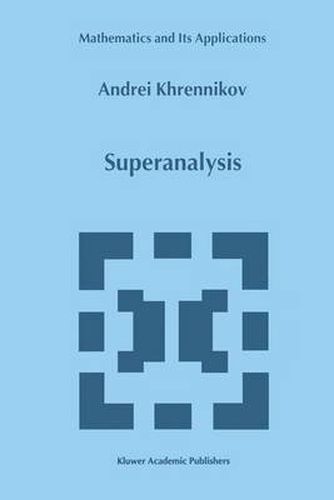Readings Newsletter
Become a Readings Member to make your shopping experience even easier.
Sign in or sign up for free!
You’re not far away from qualifying for FREE standard shipping within Australia
You’ve qualified for FREE standard shipping within Australia
The cart is loading…






This title is printed to order. This book may have been self-published. If so, we cannot guarantee the quality of the content. In the main most books will have gone through the editing process however some may not. We therefore suggest that you be aware of this before ordering this book. If in doubt check either the author or publisher’s details as we are unable to accept any returns unless they are faulty. Please contact us if you have any questions.
This work could be recommended as a course in superanalysis, the theory of functions of commuting and anticommuting variables. It follows the so-called functional superanalysis which was developed by J. Schwinger, B. De Witt, A. Rogers, V.S. Vladimirov and I.V. Volovich, Yu. Kobayashi and S. Nagamashi, M. Batchelor, U. Buzzo and R. Cianci and the present author. In this approach, superspace is defined as a set of points on which commuting and anticommuting coordinates are given. Thus functional superanalysis is a natural generalization of Newton’s analysis (on real space) and strongly differs from the so-called algebraic analysis which has no functions of superpoints, and where functions are just elements of Grassmann algebras. It offers the possibility of extending the notion of space, and of operating on spaces which are described by noncommuting coordinates. These supercoordinates, which are described by an infinite number of ordinary real, complex or p-adic coordinates, are interpreted as creation or annihilation operators of quantum field theory. Subjects treated include differential calculus, including Cauchy-Riemann conditions, on superspaces over supercommutative Banach and topological superalgebras; integral calculus, including integration of differential forms; theory of distributions and linear partial differential equations with constant coefficients; calculus of pseudo-differential operators; analysis on infinite-dimensional superspaces over supercommutative Banach and topological supermodules; infinite-dimensional superdistributions and Feynman integrals with applications to superfield theory; noncommutative probabilities (central limit theorem); and non-Archimedean superanalysis.
$9.00 standard shipping within Australia
FREE standard shipping within Australia for orders over $100.00
Express & International shipping calculated at checkout
This title is printed to order. This book may have been self-published. If so, we cannot guarantee the quality of the content. In the main most books will have gone through the editing process however some may not. We therefore suggest that you be aware of this before ordering this book. If in doubt check either the author or publisher’s details as we are unable to accept any returns unless they are faulty. Please contact us if you have any questions.
This work could be recommended as a course in superanalysis, the theory of functions of commuting and anticommuting variables. It follows the so-called functional superanalysis which was developed by J. Schwinger, B. De Witt, A. Rogers, V.S. Vladimirov and I.V. Volovich, Yu. Kobayashi and S. Nagamashi, M. Batchelor, U. Buzzo and R. Cianci and the present author. In this approach, superspace is defined as a set of points on which commuting and anticommuting coordinates are given. Thus functional superanalysis is a natural generalization of Newton’s analysis (on real space) and strongly differs from the so-called algebraic analysis which has no functions of superpoints, and where functions are just elements of Grassmann algebras. It offers the possibility of extending the notion of space, and of operating on spaces which are described by noncommuting coordinates. These supercoordinates, which are described by an infinite number of ordinary real, complex or p-adic coordinates, are interpreted as creation or annihilation operators of quantum field theory. Subjects treated include differential calculus, including Cauchy-Riemann conditions, on superspaces over supercommutative Banach and topological superalgebras; integral calculus, including integration of differential forms; theory of distributions and linear partial differential equations with constant coefficients; calculus of pseudo-differential operators; analysis on infinite-dimensional superspaces over supercommutative Banach and topological supermodules; infinite-dimensional superdistributions and Feynman integrals with applications to superfield theory; noncommutative probabilities (central limit theorem); and non-Archimedean superanalysis.